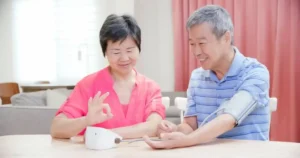Singapore faces a critical diabetes epidemic, particularly among its aging population. With one in three Singaporeans aged 65 and above living with diabetes, nearly double the global average, effective management strategies for elderly diabetics have become a national priority. This comprehensive guide explores evidence-based approaches to diabetes care for seniors in Singapore, highlighting the crucial role of professional caregiver support.
Unique Challenges for Elderly Diabetics in Singapore
The Growing Crisis
Singapore’s rapidly aging population presents unprecedented challenges for diabetes management. By 2030, one in five Singaporeans will be aged 65 or older, significantly increasing the absolute number of elderly individuals requiring diabetes care. The Ministry of Health’s declaration of “war on diabetes” underscores the urgency of this public health crisis.
The implications extend beyond health statistics. With projections indicating exponential growth in elderly diabetics, Singapore faces an immense societal burden that will strain healthcare resources and profoundly impact family dynamics. This demographic shift signals a critical need for targeted, accessible, and culturally sensitive diabetes management strategies specifically designed for seniors.
Why Seniors Face Greater Risks
Elderly individuals with diabetes encounter heightened vulnerability due to age-related physiological changes affecting insulin sensitivity, sarcopenia (muscle mass loss) impacting metabolic health, and multiple comorbidities complicating treatment plans. Cognitive decline significantly hinders self-management capabilities, while increased hypoglycemia risk leads to dangerous falls and fractures. Additionally, atypical symptom presentation makes early detection of complications particularly challenging in this population.
These factors create a complex cycle where aging vulnerabilities complicate diabetes management, while poorly controlled diabetes accelerates functional decline. The natural processes of aging introduce vulnerabilities that then complicate disease management, and in turn, poorly managed diabetes can increase the likelihood of severe complications and loss of independence.
Essential Pillars of Elderly Diabetes Management
Culturally-Sensitive Dietary Approaches
Singapore’s vibrant hawker culture presents both challenges and opportunities for diabetes management. Many beloved traditional dishes are unfortunately high in refined carbohydrates, sugars, and unhealthy fats. However, simply advising seniors to abandon these culturally significant foods is often unrealistic and counterproductive, leading to feelings of deprivation.
A more effective approach involves making thoughtful modifications to these dishes rather than outright elimination. This means opting for brown rice instead of white, choosing steamed dishes over deep-fried options, reducing gravy and sauce portions, increasing vegetable content, and selecting smaller portion sizes. The “My Healthy Plate” guidelines recommend filling half the plate with non-starchy vegetables, one-quarter with lean protein, and the remaining quarter with quality carbohydrates.
Effective dietary management for elderly Singaporeans requires a culturally competent perspective that respects deep culinary traditions while promoting healthier choices. Dietitians and caregivers should provide practical, localized advice on modifying popular hawker dishes, such as requesting less gravy, adding more vegetables, choosing smaller rice portions, or selecting healthier protein options.
Safe Physical Activity Programs
Physical activity serves as a cornerstone of diabetes management, offering benefits beyond blood sugar control. Guidelines recommend at least 150-300 minutes per week of moderate-intensity aerobic activity and two or more sessions of muscle-strengthening activities for seniors with diabetes. Even smaller amounts of activity can provide significant health benefits.
Low-impact exercises such as daily walks, yoga, dancing, brisk walking, cycling, or swimming can significantly improve insulin sensitivity, reduce stress, enhance sleep quality, and help maintain healthy weight. For older adults, multicomponent physical activity emphasizing functional balance and strength training, performed three or more days per week, proves particularly crucial for enhancing functional capacity and preventing falls.
The benefits extend beyond glycemic control to include improved functional balance and strength, directly addressing the significant danger of falls among elderly diabetics. Regular physical activity also contributes to stress reduction and better sleep, indirectly supporting diabetes management by improving mental well-being and mitigating factors that elevate blood sugar levels.
Simplified Medication Management
A notable challenge in diabetes management for older adults involves the “adherence-control gap.” Research indicates that despite consistently high medication adherence rates, many elderly individuals with type 2 diabetes fail to achieve optimal glycemic control. This discrepancy stems largely from complex treatment regimens, unintentional behavioral lapses such as forgetfulness, and broader systemic challenges.
Cognitive decline significantly contributes to unintentional non-adherence, as seniors may struggle to remember doses or manage intricate schedules. Financial constraints can pose significant barriers, leading some seniors to skip doses or avoid filling prescriptions altogether. The fear of injections, particularly for those new to insulin, represents another common hurdle.
Simplified insulin regimens, such as twice-daily injections instead of four times daily, prove more practical and easier for older adults and their caregivers to follow. Pharmacists, given their frequent patient contact, play uniquely positioned roles in promoting medication adherence and providing essential guidance. Effective medication management requires shifting from merely prescribing to actively simplifying regimens, providing robust support systems, and addressing financial barriers.
Individualized Blood Glucose Targets
Regular blood glucose monitoring enables individuals to maintain blood sugar levels within specified target ranges, helping prevent dangerous fluctuations and reducing long-term diabetes-related complications. For frail elderly individuals or those susceptible to hypoglycemia, target ranges are often set higher to prioritize safety.
Singapore’s Ministry of Health guidelines recommend personalized HbA1c targets based on patient profiles. Functionally independent seniors with life expectancy greater than 10 years should target HbA1c levels at or below 7.0%. Functionally dependent individuals should aim for 7.1%-8.0%, while frail seniors and those with dementia should target 7.1%-8.5%. For patients with multiple comorbidities or severely limited life expectancy, targets range from less than 8.0% to 8.5%.
A critical aspect of monitoring in older adults involves recognizing that symptoms of hypoglycemia and hyperglycemia can be subtle, atypical, or entirely absent. Hypoglycemia can manifest as confusion, falls, loss of consciousness, and seizures if not promptly addressed. Conversely, untreated hyperglycemia can lead to infections, poor wound healing, and severe emergencies requiring hospital admission.
Navigating Singapore’s Healthcare Landscape

Government Support Systems
The Singaporean government demonstrates deep commitment to combating diabetes through entities like the Ministry of Health and Health Promotion Board. The national “Healthier SG” initiative focuses on preventive care and supports seniors in aging actively and healthily, encouraging adoption of healthier lifestyles including regular exercise, balanced diets, and consistent health screenings.
Government platforms like HealthHub provide reliable, accessible diabetes information, featuring practical tools such as “My Healthy Plate” guidelines and health screening recommendations for individuals aged 40 and above. Subsidies for these screenings are available under Healthier SG, making preventive care more affordable. The Community Health Assist Scheme (CHAS) and Healthier SG Chronic Tier provide crucial financial support for addressing medication adherence barriers and consistent care access.
Primary healthcare delivery occurs through public-funded polyclinics and private general practitioner clinics. Primary Care Networks (PCNs) provide structured teams of healthcare professionals comprising GPs, nurses, and care coordinators dedicated to comprehensive diabetes care. These networks offer ancillary services such as diabetic retinal photography, foot screening, and health education while facilitating care coordination across different providers.
Community Resources
Singapore boasts a robust network of community programs designed to provide comprehensive assistance beyond traditional clinical settings. Organizations like Diabetes Singapore actively provide awareness campaigns, educational programs, counseling, and support groups while offering clinical services such as diabetic retinal photography and foot screening.
The National University Health System Community Health Posts, Chronic Disease Self-Management Programme, Health Peers Programme, and TOUCH Diabetes Support offer wide-ranging services from health-related counseling and education to peer support, health screenings, and financial assistance. These programs provide essential information and practical skills while offering vital emotional and social support that significantly helps combat stress and mental health challenges associated with chronic illness.
The Critical Role of Professional Caregiver Support

Daily Management Challenges
The complexities of diabetes management for elderly individuals are compounded by age-related changes such as reduced mobility, vision problems, memory issues, and challenges managing multiple medications for various conditions. These factors make it exceedingly difficult for seniors to consistently adhere to treatment routines, necessitating comprehensive caregiver support.
Professional caregivers become indispensable in supervising treatment administration, recognizing potential complications, and assisting with daily tasks and medication schedules. They provide crucial support by helping with grocery shopping and meal preparation, maintaining food diaries, providing medication reminders, performing blood sugar checks, conducting daily foot inspections, and encouraging physical activity and social interaction.
How Professional Caregivers Make a Difference
Helpling.com.sg offers specialized elderly care services directly addressing diabetes management needs through experienced caregivers with extensive experience, often exceeding 10 years. While services aren’t explicitly branded as “diabetes management,” they demonstrate strong alignment with core daily needs of elderly individuals managing diabetes.
Helpling caregivers provide oral feeding and medication assistance, directly addressing consistent medication intake and proper nutritional support needs. They facilitate exercise and simple activities for seniors, supporting essential physical activity recommendations for blood sugar control. Services like assisted showering, dressing, and toileting maintain overall hygiene and prevent complications, especially for individuals with reduced mobility.
Assistance with movement using wheelchairs or walking sticks helps seniors remain active and engaged, contributing to physical well-being and indirectly supporting better diabetes control. Light housekeeping and laundry services reduce stress, allowing individuals to focus more on health management. Companionship provision proves significant, as emotional well-being and reduced stress represent crucial factors in effective glycemic control.
FAQ: Diabetes Management for Elderly Singaporeans
What are the warning signs of diabetes complications in seniors?
Watch for confusion (possible hypoglycemia), excessive thirst or urination (hyperglycemia), slow-healing wounds, frequent infections, vision changes, or unexplained fatigue. Seek immediate medical attention for severe symptoms like loss of consciousness or severe confusion.
How can families afford diabetes care for elderly relatives in Singapore?
Utilize government subsidies through CHAS, Healthier SG programs, and polyclinic services. Community organizations like Diabetes Singapore also offer financial assistance programs for qualifying individuals.
What should caregivers know about managing diabetes medications?
Understand each medication’s purpose, timing, and side effects. Maintain updated medication lists, check expiration dates, and coordinate with pharmacists for adherence strategies. Never adjust doses without medical consultation.
How do I choose the right healthcare provider for elderly diabetes care?
Look for providers within Primary Care Networks offering coordinated care. Ensure access to nurses, dietitians, and care coordinators. Consider proximity, language preferences, and integrated geriatric care capabilities.
Can elderly diabetics still enjoy Singapore’s local cuisine?
Absolutely! Focus on portion control, choose healthier preparations (steamed vs. fried), opt for brown rice, and balance meals with vegetables. Work with dietitians familiar with local foods for practical meal planning.
What technology can help with diabetes management for seniors?
Continuous Glucose Monitors (CGMs) provide real-time blood sugar data, medication reminder apps help with adherence, and smartphone apps can track meals and exercise. Choose user-friendly options appropriate for comfort levels.
How important is family support in elderly diabetes management?
Family support proves crucial for motivation, appointment attendance, medication adherence, and emergency response. However, professional caregiver support can supplement family care, especially for complex daily management needs.
What exercise is safe for elderly diabetics with limited mobility?
Chair exercises, gentle stretching, water aerobics, and short walking sessions provide excellent options. Always consult healthcare providers before starting new activities and focus on consistency over intensity.
Take Action: Professional Diabetes Care Support
Managing diabetes in elderly loved ones requires comprehensive, consistent support that often exceeds family capabilities. Professional caregivers provide specialized attention needed to maintain independence while ensuring optimal health outcomes. The comprehensive support provided by caregivers forms the critical backbone of effective elderly diabetes management, ensuring seniors can live well, maintain independence, and enjoy fulfilling lives despite their condition.
Helpling.com.sg’s elderly care services offer experienced, compassionate caregivers trained to support daily diabetes management needs. From medication reminders to healthy meal preparation and exercise encouragement, professional care ensures consistent, quality support while preserving dignity and independence.
Don’t navigate elderly diabetes care alone. Explore Helpling’s personalized care solutions today and discover how professional support can enhance your family’s diabetes management journey while maintaining your loved one’s quality of life and independence.






